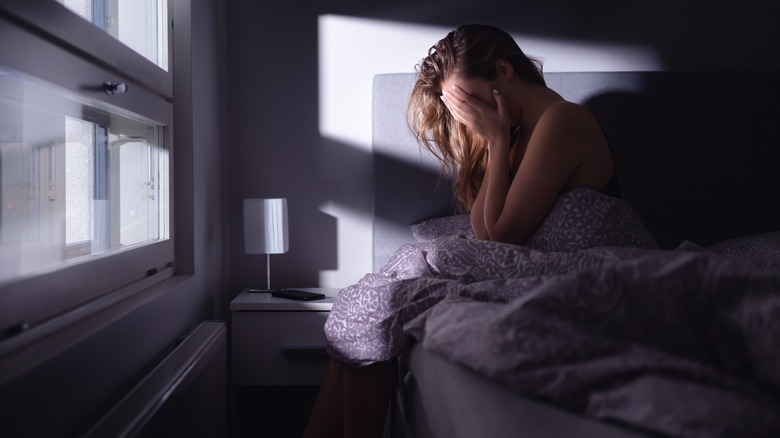What To Know About Sexsomnia & How You Can Treat The Disorder
We're all guilty of doing weird things while we sleep. Even if you don't sleepwalk, you've probably been told by a friend or partner that you've said some strange stuff, thrashed around violently, or even accidentally wet the bed, despite not having done so since childhood. But while these incidents are relatively harmless, some nighttime behaviors are problematic, and one of those things is sexsomnia.
While sexsomnia falls under the category of parasomnia sleep disorders like sleepwalking, sleep eating, and similar behaviors, it's also an arousal disorder, as psychiatrist Dr. Carlos Schenck told CNN. "They most often occur during the slowest, deepest stage of sleep, called delta sleep," said Schenck. "It's like an alarm or trigger goes off in the central nervous system, and you go from your basement to your roof in no time flat ... Your cognition is deeply asleep, and you're not with the program, but your body is activated." Interestingly, you don't even have to be dreaming about sex for any of this to occur.
But the problem with sexsomnia is that feelings of shame can prevent proper diagnoses. If someone regularly wakes up with a sensitive vulva or penis from aggressive sleep masturbation or someone is fondled in their sleep by their partner who has undiagnosed sexsomnia, these situations could stand in the way of talking to a doctor. Even if you've never experienced sexsomnia, it's a legitimate disorder that can happen to anyone, so it's worth familiarizing yourself with it.
What sexsomnia looks like
According to a 2021 study published in Sleep Science, sexsomnia is a disorder in which someone engages in sexual behavior when they're asleep. As a 2007 study published in Sleep found, this behavior runs the gamut and can include everything from masturbation and dirty talk to spontaneous orgasms, or even initiating sex with the person in the bed with them — all while they're asleep. The same study found that in most cases, the person has zero memory of their sexual activity.
What makes sexsomnia even more perplexing, is the behavior that's exhibited could be opposite from anything you might do sexually in your waking life. "In sexsomnia, the sexual behavior can be outside your normal behavior or it can be your normal sexual behavior," sleep specialist and neurologist Marri Horvat, MD, MS told Cleveland Health Clinic. For example, you could be adamant that 69-ing isn't a position you like when you're awake, but when you're asleep your partner might find you trying to straddle their face and initiate a 69 — and this is in no way an exaggeration. "But you're unaware it's occurring, and it's unintentional," said Horvat.
Possible triggers
Although research has yet to pinpoint why sexsomnia episodes occur, they've found that there are things that can possibly trigger them. "Sexsomnia occurs outside of dream sleep and likely occurs as the person transitions through the phases of sleep," said doctor of osteopathic medicine and family medicine and a sleep medicine specialist Keisha Sullivan, DO to Everyday Health. Because of this, the person isn't as deeply asleep as they would be at other points in their sleep cycle, so even the slightest disturbance — a door closing, a light being turned on or off, or even a partner's cough — could induce an episode. Health conditions, too, that affect a peaceful night's sleep like "restless legs syndrome, teeth grinding, heartburn, sleep apnea, insomnia, and sleep-related seizures," could also be triggers, added Sullivan.
While disturbances of all kinds can play a role in triggering sexsomnia episodes, gender can also play a factor. According to a 2010 study published in the American Academy of Sleep Medicine, sexsomnia is almost three times more prevalent in men, at 11%, compared to women, at 4%. Men are also more likely to be aggressive during these incidents, while women tend to turn toward masturbation instead. Even in sleep women know sexual self-care is an important part of their wellness routine.
How to treat sexsomnia
The first step in treating sexsomnia is admitting that something is wrong. Which, considering what sexsomnia is and what it involves, can be difficult. But once you can do that, the hard part is over and you can talk to your doctor about treatment.
When seeking treatment, your doctor is going to try to get to the source — as in the trigger — that might be behind the episodes. This could mean prescribing medication for health conditions that interrupt your sleep, like heartburn or sleep apnea, or they may suggest giving your bedtime routine a whole overhaul, like getting on a sleep schedule in an environment free of distractions. "You must avoid any external stimulation that could trigger sexsomnia," sleep specialist and neurologist Marri Horvat, MD, MS told Cleveland Health Clinic. "Both internal and external things that make you uncomfortable or half wake you up can trigger episodes, so you should avoid them."
While masturbating in your sleep may not sound like the worst thing in the world, where things get complicated are the legal concerns behind sexsomnia. Although any doctor will be able to speak on your behalf and explain that these episodes are out of your control, should you end up hurting someone, that's not going to be an easy situation to navigate. So, if you think you might be displaying sexsomnia-related behavior in your sleep, talk to a doctor and start treatment immediately — for you and everyone who might share a bed with you.



